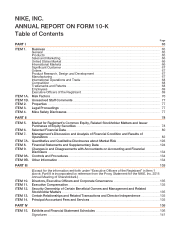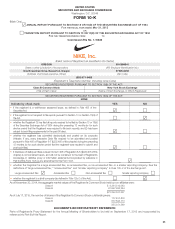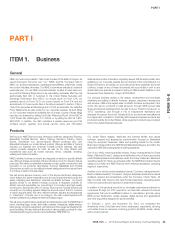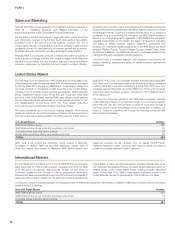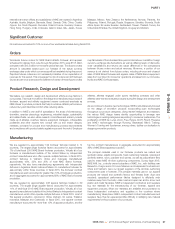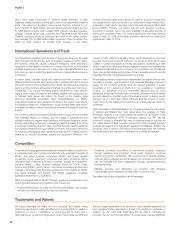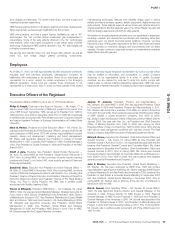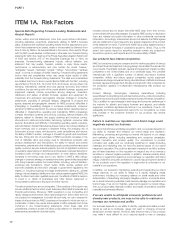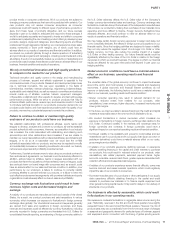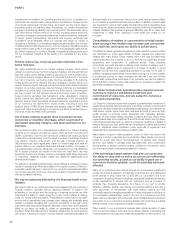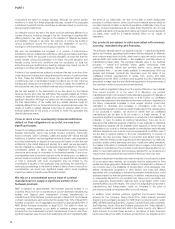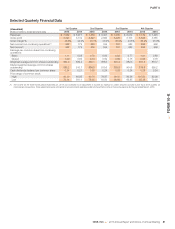Nike 2015 Annual Report Download - page 12
Download and view the complete annual report
Please find page 12 of the 2015 Nike annual report below. You can navigate through the pages in the report by either clicking on the pages listed below, or by using the keyword search tool below to find specific information within the annual report.
PART I
failure to successfully respond to these risks might adversely affect sales in
our e-commerce business, as well as damage our reputation and brands.
Failure to adequately protect or enforce our intellectual
property rights could adversely affect our business.
We believe that our intellectual property rights are important to our brand, our
success and our competitive position. We periodically discover products that
are counterfeit reproductions of our products or that otherwise infringe on our
intellectual property rights. If we are unsuccessful in enforcing our intellectual
property, continued sales of these products could adversely affect our sales
and our brand and could result in a shift of consumer preference away from
our products.
The actions we take to establish and protect our intellectual property rights
may not be adequate to prevent imitation of our products by others or to
prevent others from seeking to block sales of our products as violations of
proprietary rights.
We may be subject to liability if third parties successfully claim that we infringe
on their intellectual property rights. Defending infringement claims could be
expensive and time-consuming and might result in our entering into costly
license agreements. We also may be subject to significant damages or
injunctions against development, use, importation and/or sale of certain
products.
We take various actions to prevent the unauthorized use and/or disclosure of
confidential information. Such actions include contractual measures such as
entering into non-disclosure and non-compete agreements and providing
confidential information awareness training. Our controls and efforts to
prevent unauthorized use and/or disclosure of confidential information might
not always be effective. Confidential information that is related to business
strategy, new technologies, mergers and acquisitions, unpublished financial
results or personal data could be prematurely or inadvertently used and/or
disclosed, resulting in a loss of reputation, a decline in our stock price and/or a
negative impact on our market position, and could lead to damages, fines,
penalties or injunctions.
In addition, the laws of certain countries may not protect or allow enforcement
of intellectual property rights to the same extent as the laws of the United
States. We may face significant expenses and liability in connection with the
protection of our intellectual property rights, including outside the United
States, and if we are unable to successfully protect our rights or resolve
intellectual property conflicts with others, our business or financial condition
may be adversely affected.
We are subject to the risk that our licensees may not
generate expected sales or maintain the value of our
brands.
We currently license, and expect to continue licensing, certain of our
proprietary rights, such as trademarks or copyrighted material, to third parties.
If our licensees fail to successfully market and sell licensed products, or fail to
obtain sufficient capital or effectively manage their business operations,
customer relationships, labor relationships, supplier relationships or credit
risks, it could adversely affect our revenues, both directly from reduced
royalties received and indirectly from reduced sales of our other products.
We also rely on our licensees to help preserve the value of our brands.
Although we attempt to protect our brands through approval rights over the
design, production processes, quality, packaging, merchandising,
distribution, advertising and promotion of our licensed products, we cannot
completely control the use of our licensed brands by our licensees. The
misuse of a brand by a licensee could have a material adverse effect on that
brand and on us.
We are subject to data security and privacy risks that could
negatively affect our results, operations or reputation.
Hackers and data thieves are increasingly sophisticated and operate large-
scale and complex automated attacks. Any breach of our network may result
in the loss of valuable business data, misappropriation of our consumers’ or
employees’ personal information or a disruption of our business, which could
give rise to unwanted media attention, materially damage our customer
relationships and reputation and result in lost sales, fines or lawsuits.
In addition, we must comply with increasingly complex and rigorous
regulatory standards enacted to protect business and personal data. Any
failure to comply with these regulatory standards could subject us to legal and
reputational risks. Misuse of or failure to secure personal information could
also result in violation of data privacy laws and regulations, proceedings
against the Company by governmental entities or others, damage to our
reputation and credibility and could have a negative impact on revenues and
profits.
Failure of our contractors or our licensees’ contractors to
comply with our code of conduct, local laws and other
standards could harm our business.
We work with hundreds of contractors outside of the United States to
manufacture our products, and we also have license agreements that permit
unaffiliated parties to manufacture or contract for the manufacture of products
using our intellectual property. We require the contractors that directly
manufacture our products and our licensees that make products using our
intellectual property (including, indirectly, their contract manufacturers) to
comply with a code of conduct and other environmental, health and safety
standards for the benefit of workers. We also require these contractors to
comply with applicable standards for product safety. Notwithstanding their
contractual obligations, from time to time contractors may not comply with
such standards or applicable local law or our licensees may fail to enforce
such standards or applicable local law on their contractors. Significant or
continuing noncompliance with such standards and laws by one or more
contractors could harm our reputation or result in a product recall and, as a
result, could have an adverse effect on our sales and financial condition.
Our international operations involve inherent risks which
could result in harm to our business.
Virtually all of our athletic footwear and apparel is manufactured outside of the
United States, and the majority of our products are sold outside of the United
States. Accordingly, we are subject to the risks generally associated with
global trade and doing business abroad, which include foreign laws and
regulations, varying consumer preferences across geographic regions,
political unrest, disruptions or delays in cross-border shipments and changes
in economic conditions in countries in which our products are manufactured
or where we sell products. In addition, disease outbreaks, terrorist acts and
military conflict have increased the risks of doing business abroad. These
factors, among others, could affect our ability to manufacture products or
procure materials, our ability to import products, our ability to sell products in
international markets and our cost of doing business. If any of these or other
factors make the conduct of business in a particular country undesirable or
impractical, our business could be adversely affected. In addition, many of our
imported products are subject to duties, tariffs or quotas that affect the cost
and quantity of various types of goods imported into the United States and
other countries. Any country in which our products are produced or sold may
eliminate, adjust or impose new quotas, duties, tariffs, safeguard measures,
anti-dumping duties, cargo restrictions to prevent terrorism, restrictions on
the transfer of currency, climate change legislation, product safety regulations
or other charges or restrictions, any of which could have an adverse effect on
our results of operations and financial condition.
Changes in tax laws and unanticipated tax liabilities could
adversely affect our effective income tax rate and
profitability.
We earn a substantial portion of our income in foreign countries, and are
subject to the tax laws of those jurisdictions. The Company’s most significant
tax liabilities are incurred in the United States, China and the Netherlands. If
our capital or financing needs in the U.S. require us to repatriate earnings from
foreign jurisdictions above our current levels, our effective income tax rates for
the affected periods could be negatively impacted. Current economic and
political conditions make tax rules in any jurisdiction, including the U.S.,
subject to significant change. There have been proposals to reform U.S. and
foreign tax laws that could significantly impact how U.S. multinational
NIKE, INC. 2015 Annual Report and Notice of Annual Meeting 73
FORM 10-K


